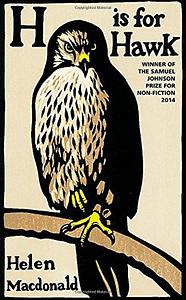You need to sign in or sign up before continuing.
Take a photo of a barcode or cover
informative
reflective
slow-paced
Too difficult for me to read about a captive hawk. My heart breaks for the poor thing
I could relate to so much of the kind of lost emotional turmoil Helen Macdonald describes, and liked learning about hawking-- some really great passages too about the relationship between humans and the wild. Also, I like quirky British storytellers, which is probably the main reason I am glad this book exists
I probably wouldn't have picked up this book had it not been required, and although I don't really have any strong feelings on it, it was a decent read.
I saw a presentation given by a falconer the day I finished this, and he said that he and many others actually aren't fans of the memoir, based on the lack of actual falconry in the book. I would actually disagree for the opposite reason, and say that even at the end, I wasn't interested in the falconry at all. I was more invested in the parts dealing with her dad and her day-to-day life, and I feel like the narrative really didn't focus on those enough to be effective.
The writing was pretty average on most parts. Nothing really stuck out to me, although I actually groaned at
I saw a presentation given by a falconer the day I finished this, and he said that he and many others actually aren't fans of the memoir, based on the lack of actual falconry in the book. I would actually disagree for the opposite reason, and say that even at the end, I wasn't interested in the falconry at all. I was more invested in the parts dealing with her dad and her day-to-day life, and I feel like the narrative really didn't focus on those enough to be effective.
The writing was pretty average on most parts. Nothing really stuck out to me, although I actually groaned at
Then I knew. I knew that my father had died. I knew he was dead because that was the sentence she said after the pause and she used a voice I'd never heard before to say it. Dead.
Like, I'm sorry, because I understand the grief in that paragraph, but also... repetition by itself isn't great writing. It just came across as trying too hard.
I respect what Macdonald did, especially because it is important to have coming-of-age tales outside of adolescence (I liked how this was a real emotional journey later in life), and I appreciate the book for what it was, but at the end of the day it just wasn't for me.
challenging
informative
reflective
medium-paced
challenging
emotional
informative
inspiring
reflective
sad
tense
slow-paced
slow-paced
informative
reflective
medium-paced
Helen MacDonald is an English teacher and experienced falconer, but takes on a bold new adventure in adopting and training a fierce and complex goshawk, which is a wild and temperamental creature compared to falcons. She names the hawk Mabel, and developing a relationship with the hawk is Helen’s way of coping with her father’s recent death and processing her own bereavement.
Helen is forced to put herself “in the hawk’s wild mind” to tame her and understand her. Through interactions with Mabel, Helen becomes aware of her own myriad of emotions – grief, frustration, rage, incredulity, and sadness. Mabel is just a child, and Helen mourns her own childhood. “Children go through states of mind comparable to mourning, and this early-mourning is revived whenever grief is experienced later in life.” The hawk’s hunting reveals death and helps her cope with sacrifice and loss. Helen is forced to ask herself, “Can you contain a hawk without breaking its natural spirit?”
“The hawk is everything I wanted to be: solitary, self-possessed, free from grief, and numb to the hurts of human life.”
While this story is deep, symbolic and heart-wrenching at times, I have to admit that it was also boring. I struggled to relate to Helen and felt mostly unmoved by the story. Many other reviewers gave this book high ratings, but it just wasn’t for me.
Helen is forced to put herself “in the hawk’s wild mind” to tame her and understand her. Through interactions with Mabel, Helen becomes aware of her own myriad of emotions – grief, frustration, rage, incredulity, and sadness. Mabel is just a child, and Helen mourns her own childhood. “Children go through states of mind comparable to mourning, and this early-mourning is revived whenever grief is experienced later in life.” The hawk’s hunting reveals death and helps her cope with sacrifice and loss. Helen is forced to ask herself, “Can you contain a hawk without breaking its natural spirit?”
“The hawk is everything I wanted to be: solitary, self-possessed, free from grief, and numb to the hurts of human life.”
While this story is deep, symbolic and heart-wrenching at times, I have to admit that it was also boring. I struggled to relate to Helen and felt mostly unmoved by the story. Many other reviewers gave this book high ratings, but it just wasn’t for me.



